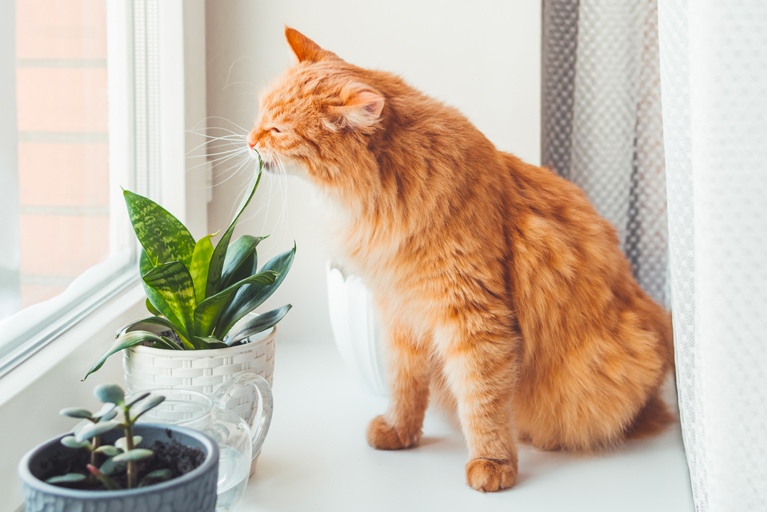
Houseplant inspiration for owners of curious, plant-nibbling cats and dogs
Indoor plants add life, vibrancy, and color to a home, and improve mental and physical health. And while there are lots of fantastic indoor plants to choose from, not all of them are pet friendly. Some houseplants are toxic to cats and dogs. They can cause illness (or worse) if they decide to chow down on them.
Keeping your cat, dog, or other furry critter safe is easy. All you need is some time to do a bit of research and this guide, which covers:
- the pet-friendly plants that grow well indoors
- common toxic house plants you should avoid
- tips to stop pets munching plants
- common symptoms of poisoning
- getting help if your pet is unwell.
We’ve also included a toxic plant checker that’s worth bookmarking.
12 indoor plants that are pet safe
Here are a dozen pet-friendly plants that are considered non-toxic to cats and dogs.
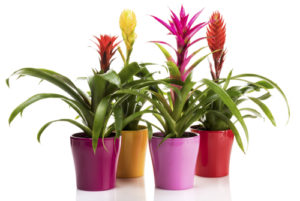 1. Bromeliads
1. Bromeliads
These tough plants enjoy tropical climates. And despite the bright colors of its flowers, which could be mistaken as a warning, they’re completely harmless.
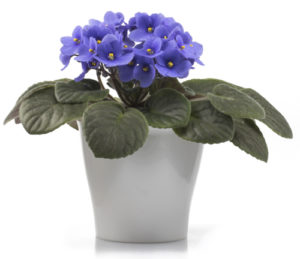 2. African Violet
2. African Violet
The African Violet may look cool, but this flowering indoor plant enjoys warm temperatures and a little humidity. It also thrives and flowers in low light. You may hear it being called Cape Marigold or its scientific name, Saintpaulia.
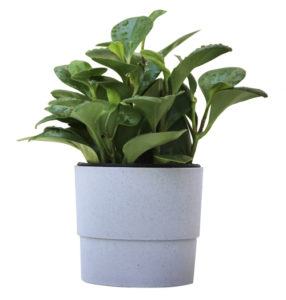 3. American rubber plant ‘Peperomia obtusifolia’
3. American rubber plant ‘Peperomia obtusifolia’
Featuring broad, dark green rubbery leaves with a fleshy look, curious cats and dogs find these plants irresistible. Fortunately, the leaves and stem of the American Rubber Plant (also known as Pepper Face or Baby Rubber Plant) are pet friendly.
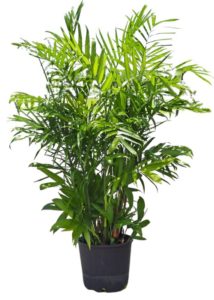 4. Areca Palm (Dypsis lutescens)
4. Areca Palm (Dypsis lutescens)
Add some tropical vibes to your home with an Areca Palm. Its long, leafy fronds are bound to attract the attention of playful pets, but that’s OK because it’s non-toxic. Place in a sunny area and only water once the soil has dried out.
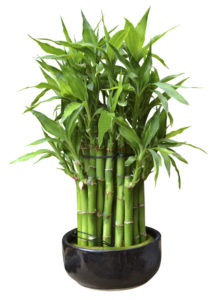 5. Bamboo (Phyllostachys aurea)
5. Bamboo (Phyllostachys aurea)
Phyllostachys aurea is safe for cats and dogs. While we don’t recommend adding it to their dinner, true bamboo shouldn’t give your four-legged friend too many problems if they ingest a leaf or two. But not every plant we call “bamboo” is pet-safe, so make sure you check before you bring one home.
 6. Bamboo Palm (Chamaedorea seifrizii)
6. Bamboo Palm (Chamaedorea seifrizii)
The thin but plentiful fronds of the bamboo palm are great for filling empty space. They’re known for growing tall and being a good indoor plant for low-light homes. You may also hear them being called Parlor Palms or Good Luck Palms.
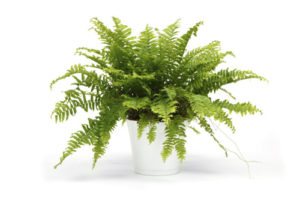 7. Boston Fern (Nephrolepis exaltata)
7. Boston Fern (Nephrolepis exaltata)
The Boston Fern is one of the few ferns that are pet friendly. And when left to grow wild and free, they look great in hanging pots. For indoors, place your pot in a macramé hanger for a softer style.
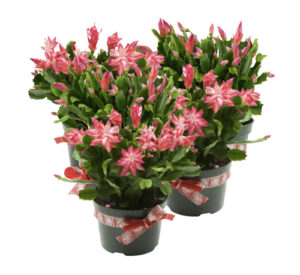 8. Christmas Cactus (Schlumbergera bridgessii)
8. Christmas Cactus (Schlumbergera bridgessii)
Like all good succulents, the Christmas Cactus needs little attention. Dry conditions, some sunlight, and occasional watering will bring out the best of this flowering indoor plant.
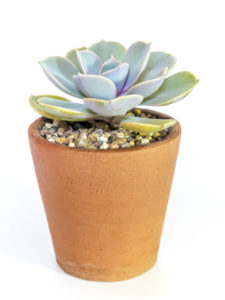 9. Echeveria ssp
9. Echeveria ssp
While we’re on the subject of succulents, a pet-friendly variety you can rely on is the Echeveria family. The beautiful rosette shape of these looks great in individual pots or a larger indoor terrarium. They’re also easy to propagate.
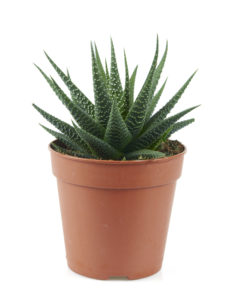 10. Haworthia ssp
10. Haworthia ssp
The attractive striped pattern on Haworthia may catch your dog or cat’s attention, but hopefully the spiky shape will put them off nibbling this small succulent.
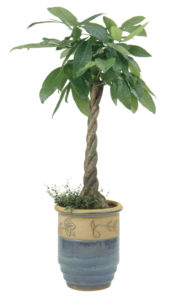 11. Money Tree (Pachira Aquatica)
11. Money Tree (Pachira Aquatica)
Money Trees enjoy bright rooms, indirect sunlight and infrequent watering. If you don’t want your tree to dominate your indoor room, keep it small and neat with frequent pruning.
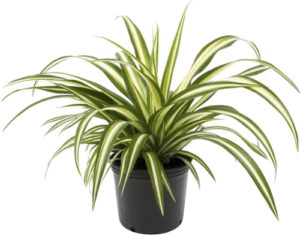
12. Spider Plant (Chlorophytum comosum)
Brighten up your kitchen, bathroom, or living room with a spider plant. Their light green and white leaves and playful airy nature add life and movement. The best bit? Spider plants are easy to grow indoors and require little maintenance.
Toxic house plants you should avoid
Sadly, some of the most popular, easy-to-care-for, air-purifying plants are toxic to cats and dogs. These include:
- Ivy/Pothos (Golden or Devil’s Ivy)
- Philodendron
- Snake Plant
- Sago Palms
- Peace Lily
- ZZ Plant.
A single plant can go by several different names. They have a scientific name, as well as the everyday name we call them. They can even have multiple nicknames. To make sure there’s no confusion, it’s always worth double checking whether a plant is pet-safe or not.
Checking which plants are safe
The American Society for the Prevention of Cruelty to Animals (ASPCA) has a poisonous plant checker. It’s an extensive list of indoor and outdoor plants that are toxic to cats, dogs, and horses. If you have any doubts, type the name of the plant you want to check in the search box. Using the scientific name is more accurate. You’ll quickly see whether or not you’ve got a pet-friendly house plant on your hands.
Signs your dog or cat may have eaten a toxic plant
How your dog or cat reacts after eating a toxic plant depends on:
- what they’ve eaten
- how much they’ve eaten
- the breed
- their age
- any existing medical conditions.
Signs your four-legged critter has chowed down on your plants include vomiting, diarrhea, loss of appetite, and drooling. More severe symptoms of plant poisoning are seizures, fits, foaming at the mouth, problems breathing, organ failure, and lethargy.
If you think your cat or dog has munched on something they shouldn’t have (plant or otherwise), contact your local vet or the Animal Poison Control at 888.426.4435.
Play it safe. Stop your pets from eating plants
Even plants considered pet-safe can potentially cause trouble if your furry friend eats it in large quantities. To avoid damage and loss of your indoor plant babies, do your pet and your plant a favor. Keep them out of reach of each other.
Putting them up high where animals can’t get at them is a good rule of thumb. If you’re a cat owner this may be easier said than done. But if you have a dog, you may want to consider training so they learn that plants are off the menu.
Armed with this knowledge you can shop for indoor plants with confidence. Put together a list of the plants you’re interested in, and we’ll be happy to help you find them in our store.
 Order by Noon for Same Day Flower Delivery
Order by Noon for Same Day Flower Delivery